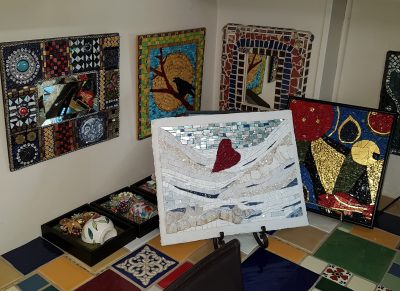I’m not great at finding time to play, and that’s been especially true lately with so many demands on my time. But as Julia Cameron talks about in “The Artist’s Way” it’s critical to take breaks, interact with the world and fill the inner well that fuels our creativity.
I thought about that last week when I took a class from Debra Hagen, a Nanoose Bay artist who specializes in mosaic art. I knew almost nothing about mosaics until I visited Debra at her house (okay, technically Team Sheltie went on a play date to visit Debra’s two shelties, Seamas and Merlin, and the humans accompanied them). Her home is vibrant, welcoming and filled with samples of her gorgeous mosaic art. 
Every piece drew me in. Some were bold, others were more subtle, but they were all beautiful. When Debra said she gave classes in her studio downstairs, I was tempted, though I’m not at all artistic. I can’t draw, paint, or sculpt I told her. I’m lousy with textiles. I’d probably mess up papier-mache.
Debra assured me it didn’t matter, so I decided to make a trivet. Something bright for my new kitchen.
Debra’s studio overlooks the garden and it has the kind of happy vibe found in any creative space: a feeling of expectancy and a sense of promise. Plus, it’s filled with more of Debra’s stunning art.

I enjoyed a cup of tea while Debra gave me a very brief introduction to mosaics. She pointed out her many containers of tesserae, the small blocks of stone, tile, glass or other materials used to make mosaics . . . and the pottery and china that can be broken up and also used in a mosaic. It’s referred to as pique assiette.

She talked about the substrate or rigid surface that you need to form the base, the adhesive or glue that’s used to attach the tesserae, and the basic tools like the wheeled nippers I’d need to do the job.
Like writing, the first step was settling on an idea and getting started. I quickly realized saying I was going to make a trivet was like saying I was going to write a novel. The statement was too broad. In the same way that a novel needs a plot or a character or a problem from which to build, my trivet needed something from which to build too: a central focus or a color or a piece of tile. Something. I decided on a heart for the center which Debra helped me outline on my plywood substrate.

We looked at the various bits of red tesserae that might work, but I wasn’t hooked. My eye kept going back to the china and pottery.

I found a plate with colors and a pattern I quite liked. Though it wasn’t at all red or heart-themed, something told me to go with it. I began breaking it up.

I hadn’t consciously noticed the couple on the plate when I chose it, but as I began to play with my layout, I decided they would form the center of the heart. How could they not?

Because I wanted to be sure I was happy with my layout, I placed many of the pieces on my substrate before I began gluing. That made for a longer process but I felt more confident doing it that way. At the end of the day, I wasn’t finished, but my heart had taken shape and I was thinking about background colors which I’ll tackle next time. 
Once the background tesserae is glued down, those small pieces will need 48 hours to dry before it’s time for the final step: grouting.
I left Debra’s studio feeling refreshed and energized . . . and thinking about my next mosaic project!
Debra is a great teacher. She’s instructive and helpful, and at the same time she’s wise enough to step back and let the artistic process unfold. For more information on her classes or to buy one of her mosaics, she can be reached at go************@***il.com
 Put up your hand if you think e transferring money is easy, secure and foolproof. I did. I still think it’s easy but I recently learned that it’s not as secure or as foolproof as you might think.
Put up your hand if you think e transferring money is easy, secure and foolproof. I did. I still think it’s easy but I recently learned that it’s not as secure or as foolproof as you might think. There’s a lot happening here this spring. A possible house purchase (fingers crossed because this one has a gorgeous garden), another trip out east to help my father, slow and steady progress on my current YA novel and plans in the works for another Laura Tobias title.
There’s a lot happening here this spring. A possible house purchase (fingers crossed because this one has a gorgeous garden), another trip out east to help my father, slow and steady progress on my current YA novel and plans in the works for another Laura Tobias title. Canadian writers might want to take note of two quickly approaching deadlines. Some deadlines might bring with them a sense of urgency or even dread, but these are what you could call happy deadlines.
Canadian writers might want to take note of two quickly approaching deadlines. Some deadlines might bring with them a sense of urgency or even dread, but these are what you could call happy deadlines. I’m not particularly patient, nor am I especially self-indulgent. If I have a job to do, I like to get on with it quickly and efficiently.
I’m not particularly patient, nor am I especially self-indulgent. If I have a job to do, I like to get on with it quickly and efficiently. Here’s a blast from the past. . . a blog post I wrote in 2013 that’s as true today as it was back then.
Here’s a blast from the past. . . a blog post I wrote in 2013 that’s as true today as it was back then. Today is the first day of spring in the Pacific Northwest and for once the weather is in line with the calendar. The sun is shining, clear and strong. The crocuses are up. The birds are in high spirits. And so, apparently, are the sea otters. Yesterday, one propelled its way up from the water’s edge to our house. I know they’re cute (at least some people think so) but they’re particularly aggressive with dogs so I’m careful to watch Team Sheltie when they’re out in the garden. Because the weather is warming up, the garden is on my mind and one of my current book picks reflects that. Here’s what I’m reading this month:
Today is the first day of spring in the Pacific Northwest and for once the weather is in line with the calendar. The sun is shining, clear and strong. The crocuses are up. The birds are in high spirits. And so, apparently, are the sea otters. Yesterday, one propelled its way up from the water’s edge to our house. I know they’re cute (at least some people think so) but they’re particularly aggressive with dogs so I’m careful to watch Team Sheltie when they’re out in the garden. Because the weather is warming up, the garden is on my mind and one of my current book picks reflects that. Here’s what I’m reading this month: This Friday, March 15th, kids around the world plan to skip school to demand action on climate change. Many of them have lived with extreme conditions like wildfires, heat waves and flooding their entire lives. It seems, they say, that every year of their lives has been ‘the warmest one on record.’
This Friday, March 15th, kids around the world plan to skip school to demand action on climate change. Many of them have lived with extreme conditions like wildfires, heat waves and flooding their entire lives. It seems, they say, that every year of their lives has been ‘the warmest one on record.’ For the most part, I’m fairly disciplined with respect to my writing. It’s my day job; I show up at the same time five mornings a week and I write. I got into the habit when my kids were young and I’ve kept it up. If I’m on deadline, that writing often spills into the afternoons. If I’m not on deadline and providing I’ve already written a decent number of pages, then I’ll sometimes switch gears in the afternoon and do an editing job or research, respond to emails, or deal with any current business issues.
For the most part, I’m fairly disciplined with respect to my writing. It’s my day job; I show up at the same time five mornings a week and I write. I got into the habit when my kids were young and I’ve kept it up. If I’m on deadline, that writing often spills into the afternoons. If I’m not on deadline and providing I’ve already written a decent number of pages, then I’ll sometimes switch gears in the afternoon and do an editing job or research, respond to emails, or deal with any current business issues.
Comments